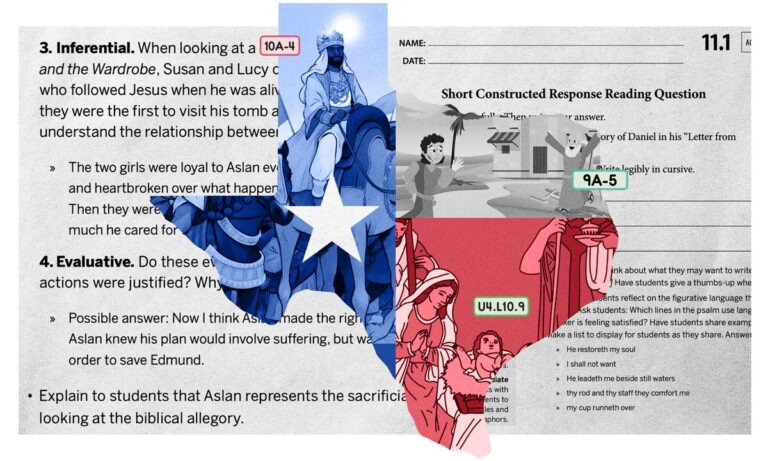Texas School Districts Integrate Bible-Based Content: A Closer Look at Curriculum Changes
Overview of Bible-Integrated Curricula in Texas Schools
In recent months, multiple school districts throughout Texas have introduced lessons that incorporate biblical themes alongside standard educational content. This blending of religious narratives with academic subjects has ignited significant discussion among parents, educators, and community stakeholders. The Houston Chronicle has compiled an extensive directory to help families and educators identify which districts have adopted these faith-infused instructional materials. This development prompts a broader conversation about the appropriate role of religion within public education and its effects on students statewide.
Texas Districts Adopting Bible-Centered Educational Programs
Several Texas school districts are currently under public scrutiny for embedding Bible-based content into their teaching frameworks. Critics contend that such integration risks crossing constitutional boundaries by merging religious instruction with secular education, potentially undermining the principle of church-state separation. Meanwhile, supporters argue that these lessons enrich studentsтАЩ understanding of cultural heritage and moral foundations. To promote transparency and informed dialogue, a detailed list of districts implementing these curricula has been made available, highlighting the scope and nature of these changes.
- East Texas Independent School District
- Lone Star Unified School District
- Baytown Regional Schools
- Midland County Public Schools
| District | Curriculum Emphasis | Applicable Grades | Current Status |
|---|---|---|---|
| East Texas ISD | Integration of Biblical Worldviews | Grades 6-8 | Active Implementation |
| Lone Star USD | History Through Scripture | Grades 9-12 | Under Review |
| Baytown Regional | Biblical Themes in Literature | Grades 3-5 | Currently Active |
| Midland County PS | Biblical Ethics in Social Studies | Grades 6-12 | Investigation Ongoing |
Examining the Content and Educational Effects of Religious Lessons in Texas Classrooms
Investigations into the newly introduced religious lessons reveal that many are designed to weave biblical stories and principles into state-mandated curricula. These lessons often portray biblical narratives as integral to understanding American history and cultural identity. While advocates claim this approach deepens studentsтАЩ appreciation of moral values and heritage, detractors caution that it may infringe upon constitutional guidelines separating religion from public education. Common themes include creationism, religious liberty, and prominent biblical figures, frequently incorporated into social studies and history classes.
Feedback from educators and students illustrates a range of experiences:
- Educators: Responses vary, with some valuing the enriched discussions and others worried about adherence to secular teaching standards.
- Students: While some engage positively with the material, others report feelings of exclusion or discomfort due to differing religious beliefs.
- Parents: Opinions are split, leading to numerous school board debates and demands for greater transparency regarding lesson content.
| District | Lesson Theme | Observed Classroom Impact |
|---|---|---|
| Dallas ISD | Creationism and Moral Education | Teacher concerns, varied student engagement |
| Austin ISD | Biblical Figures in History | Parental objections, contentious meetings |
| Houston ISD | Religious Freedom and Governance | Student interest, mixed feedback |
Community Responses and Ongoing Debates Over Educational Policies
The introduction of Bible-based lessons in Texas schools has ignited passionate discussions within community forums and school board meetings. Stakeholders including parents, teachers, and local leaders are divided, with some applauding the inclusion of traditional values and others expressing concern over the potential breach of church-state separation. Public town halls have revealed a community wrestling with issues of inclusivity, curriculum openness, and educational standards.
Simultaneously, education policymakers and legal experts are debating the broader consequences of these curricular changes. Key issues under consideration include:
- Legal challenges related to compliance with federal education and constitutional laws.
- Uniformity of curriculum across districts and its effects on standardized assessments.
- Teacher readiness to effectively balance religious narratives with factual historical content.
- Parental rights concerning opting out or supplementing instruction based on personal beliefs.
| Group | Stance | Primary Concerns |
|---|---|---|
| Parents | Divided тАФ Both support and opposition | Potential religious bias, academic quality |
| Teachers | Concerned about training adequacy | Effective lesson delivery, classroom atmosphere |
| School Boards | Mixed тАФ Policy adoption debated | Legal exposure, community reactions |
| Legal Authorities | Examining constitutional compliance | First Amendment considerations |
Guidance for Parents: How to Review Your School DistrictтАЩs Curriculum Materials
Parents interested in determining whether their childтАЩs school district has adopted Bible-infused lessons can begin by exploring the districtтАЩs official website or reaching out directly to school board offices. Many districts provide access to detailed curriculum plans and procurement records under sections like Curriculum Updates or Board Meeting Archives. Additionally, parents can request public records from district administrative offices, which are legally required to disclose educational materials purchased or used in classrooms.
To better understand these documents, parents should familiarize themselves with common terms found in educational procurement and curriculum reports:
- Curricular Materials: Core textbooks and lesson packages officially adopted for classroom use.
- Supplemental Resources: Additional instructional aids that complement the main curriculum, potentially including religious content.
- Adoption Cycle: The timeline and process through which districts review and approve educational materials.
| Term | Definition | Where to Locate |
|---|---|---|
| Curricular Materials | Primary textbooks and lesson plans officially ordered by the district | District website or Board meeting minutes |
| Supplemental Resources | Additional books, media, or tools enhancing the core curriculum | Purchase orders or vendor invoices |
| Adoption Cycle | Scheduled review periods for approving instructional materials | Policy documents or annual reports |
Conclusion: Navigating the Intersection of Faith and Education in Texas
As Texas continues to explore the integration of Bible-based lessons within public school curricula, the conversation surrounding transparency, inclusivity, and educational standards remains vital. For parents, educators, and policymakers, staying informed through trustworthy sourcesтАФsuch as the Houston ChronicleтАЩs detailed district listingsтАФis crucial. Ongoing monitoring of how these materials are implemented will help ensure that public education respects the diverse beliefs of Texas communities while maintaining academic rigor.

